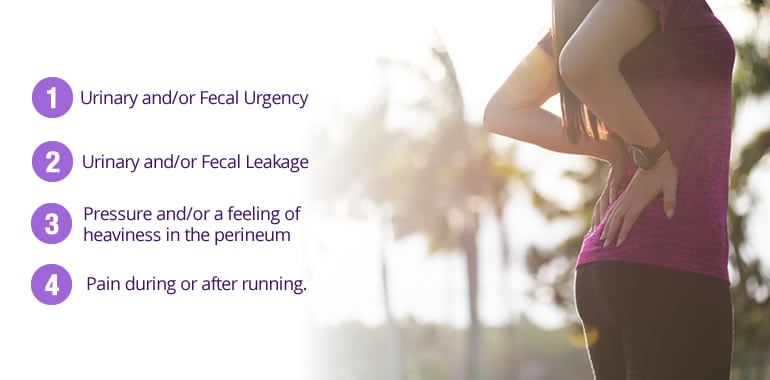
*We first wrote this post as an introduction to the challenges that you can struggle with while running. It describes common symptoms you may face as a runner that are linked to a problem with your pelvic floor. Please visit our updated post Running Strong for further detail explaining where the pelvic floor muscles are, how they should work and more understanding of the symptoms runners face that indicate they are struggling with pelvic floor dysfunction.
My love affair with running began in college as a way to combat the “freshman 15”—a result of late-night snacking while studying. Over the past 20 years, running has become my way of fighting off stress, staying physically and mentally strong, and having enough energy to be present at home and at work. Many of my friends in the running community including patients I have treated share these same sentiments. They have also shared their tales of “pelvic floor muscle fails” along the way.
Do any of these common complaints resonate with you?
All of these issues can take the joy out of running and could eventually sideline your running career altogether. At Breakaway Physical Therapy, these are common complaints we hear everyday and we are here to tell you that: 1) YOU ARE NOT ALONE! and 2) there are ways WE can help YOU resolve these pelvic floor dysfunctions.
1. Urinary and/or Fecal Urgency
Planning your route around a bathroom location or stopping halfway through your treadmill run to make a mad dash to the bathroom can take some of the fun out of running! This is especially annoying when you are only voiding a small amount despite the serious urge you had to GO RIGHT NOW! Research shows that myofascial trigger points in the pelvic floor muscles can occur while you are running which can cause bladder symptoms of urinary urgency and increased frequency.
Studies have also demonstrated that internal manual therapy by a pelvic floor physical therapist (PFPT) can help reduce these trigger points and resolve urinary and fecal urgency. You can also speak with your PFPT about dietary triggers that may be contributing to this issue.
2. Urinary and/or Fecal Leakage
Over 40% of female athletes report urinary or fecal leakage while exercising with stress urinary incontinence being the most common complaint. Whether you only notice a dribble of urine or have resorted to wearing a pad while running, your pelvic floor muscles are not doing their job efficiently. This could be happening for a number of reasons such as myofascial trigger points, pelvic floor muscle weakness, poor control and coordination of pelvic floor muscle firing, or a combination of all of the above.
Our highly trained PFPT’s will assess exactly how your pelvic floor muscles are functioning and what the best course of treatment is for you to regain continence and continue running.
3. Pressure and/or a feeling of heaviness in the perineum
This feeling may be a sign of possible pelvic organ prolapse (POP). Pelvic organ prolapse occurs when organs in the pelvic cavity, namely the bladder, uterus, and rectum, descend downward towards the vaginal opening and may even protrude through the vaginal opening. This may happen if your pelvic floor muscles are not equipped to handle the increased stress demanded of them with the increase in intraabdominal pressure that occurs with running. Pregnant women, newly postpartum mothers, and perimenopausal women with a history of multiple vaginal births are the most susceptible to pelvic organ prolapse.
For pregnant runners, the added weight from the growing baby, postural changes causing an altered center of gravity, and ligamentous laxity in preparation for childbirth cause increased downward pressure with each stride that add to the load and demand on your pelvic floor muscles. With postpartum running, particularly if you are nursing, hormonal imbalances can lead to continued ligamentous laxity not to mention the need for time to recover fully from a vaginal delivery that may have left your pelvic floor muscles weak and sore.
A Cesarean delivery is major surgery and requires even more care in regards to returning to running as your core stability has been compromised secondary to the surgical intervention. Perimenopausal women experience a significant decrease in estrogen which can lead to thinning and dryness in the delicate vaginal tissues ultimately leading to weakness of the pelvic floor muscles and surrounding connective tissues. A conversation with our PFPT’s can help you decide what steps to take to safely return to running.
4. Pain during or after running.
Ideally you should not experience pain during or after a run. Muscular soreness from a challenging route is normal and most experienced runners will use a foam roller, perform lower extremity stretches, or use ice to alleviate any discomfort. Pelvic pain while running may originate from the pelvic floor muscles, surrounding lumbopelvic musculature, and/or instability in core musculature which can all contribute to misalignment of the pelvis and sacroiliac joint thus contributing to pelvic, low back, and hip/buttock pain.
Your PFPT will assess your posture, alignment, gait, and strength as well as your pelvic floor muscle function to determine what strategies you may need to adopt or patterns you may need to alter to get you back out on the road pain-free.
At Breakaway Physical Therapy, our pelvic floor specialists put you, your needs, and your goals first to ensure that you can make a full return to running or whatever exercise you are passionate about as quickly as possible. Call us at 410-721-6333 to schedule an appointment or speak with one of our pelvic floor specialists TODAY!



